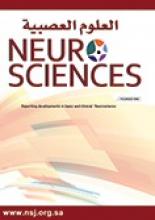Abstract
OBJECTIVE: To determine the effect of intraperitoneal (ip) nicotine on the recovery of rats receiving general anesthesia compared with placebo.
METHODS: The placebo controlled experimental study was conducted in the Faculty of Medicine, Gazi University, Turkey, between April and May 2005. Twenty-one male and 21 female rats were randomly divided into 3 groups. Group C (n=14), comprising a female group CF (n=7), and male group CM (n=7) received ip 0.9% sodium chloride (NaCl), group P (n=14), comprising a female group PF (n=7), and male group PM (n=7) received ip propofol 150 mg/kg, and group NP (n=14), comprising a female group NPF (n=7), and male group NPM (n=7) received 0.4 mg/kg ip nicotine followed by 150 mg/kg propofol after 15 minutes. For the evaluation of recovery period, tail pinch test was used, and for cognitive performance, the radial arm maze test was used.
RESULTS: The number of entrances and exits decreased in group P significantly compared to group C (p<0.05), and the decrease in group PF was higher than it was in group PM. Entrance and exit in group NP increased significantly compared to group P (p<0.05). The increase in entrance and exit in group NPF was much higher compared to group NPM. The recovery period in group NP was significantly shorter than in group P (p<0.05).
CONCLUSION: The ip administration of nicotine in rats shortens the recovery from propofol anesthesia and improves cognitive performance.
- Copyright: © Neurosciences
Neurosciences is an Open Access journal and articles published are distributed under the terms of the Creative Commons Attribution-NonCommercial License (CC BY-NC). Readers may copy, distribute, and display the work for non-commercial purposes with the proper citation of the original work.






